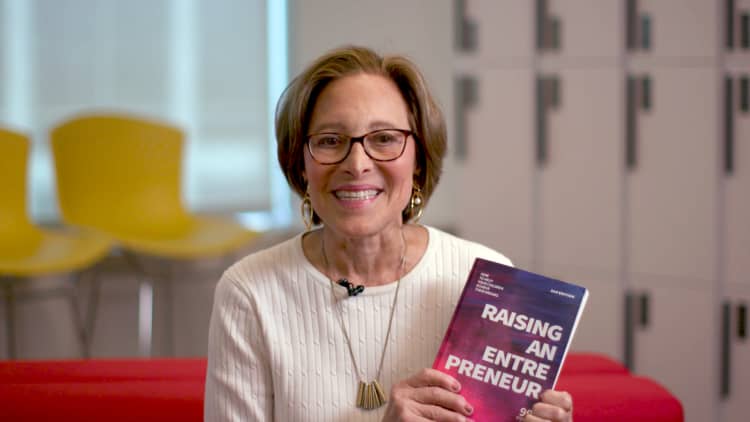Whether it's starting a business or mastering an ambitious skill, having big career goals can be exciting but overwhelming. How do you successfully achieve them while navigating the demands and responsibilities of daily life?
I know the feeling. My dream was to write a book. It took me over 10 years, but this spring, I'm finally publishing my first book: "New Happy."
As a researcher in the science of happiness, I was lucky: I was able to learn the secrets that helped me make my journey a little easier.
Here's the exact blueprint I used:
1. Identify your 'what' and 'why'
My "what" was writing a book, and my "why" was to help people find greater happiness.
One study that inspired me studied scientists who were striving to achieve extremely long-term objectives, like finding cancer treatments and seeking out extraterrestrial life. They knew that their dreams might not be achieved in their lifetime, yet felt the strong drive to pursue them regardless.
Their motivation came from having a clear vision of what it would look like to achieve their dream, and knowing how that achievement would positively impact their field, future generations, and the broader world.
2. Break your dream into short-term goals
A decade ago, I was working as a management consultant. I had no experience as a writer and no training in the field I was passionate about.
I often hear from other people who are in a similar position. Their dream involves so much change that it overwhelms them and prevents them from taking action.
To get unstuck, break your dream into short-term goals. These should take you between one to three months to achieve. Bit by bit, you close the gap between here and there.
3. Change the way you think of yourself
I started calling myself a writer well before I had ever published anything. This small shift inspired me to adopt new habits, like waking up early to write. It strengthened my determination to write a book.
If you want to open a business, start thinking of yourself as an entrepreneur. It will inspire you to invest time in educating yourself on business fundamentals, pay attention to what influences your purchasing decisions, and analyze the companies around you to identify what they could improve.
4. Create a sustainable plan
Do you usually watch television or scroll social media in the evenings? Perhaps, one day a week, you could use that time to work towards your goal.
It's far more effective to make a smaller time commitment that you can stay consistent with. During the time it took me to write my book, I had five different jobs, went to graduate school, started a business, navigated major personal challenges, and saw the world upended by a global pandemic.
Each of those different seasons of my life came with its own unique set of challenges. So as your life shifts, revisit your balance and evaluate whether or not it's working for you. And if it isn't, ask what needs to change.
5. Celebrate progress, not achievement
Researchers say that the single biggest driver of daily motivation is the feeling of making progress. It gives you a burst of positive emotions and inspire you to show up again tomorrow.
When I was writing my book, I would start every writing session by identifying a small win I could achieve that day, like choosing the scientific studies I wanted to review or identifying the pages I wanted to polish.
When you're done, take a moment to celebrate and bask in your progress.
6. Treat yourself with compassion
I grew up believing that the best way to motivate myself was through self-criticism. I thought that if I beat myself up for my mistakes and setbacks, it would help me to do a better job next time.
But self-criticism actually makes it harder to achieve your goals. It's more effective to treat yourself with self-compassion.
Here are some ways to do that:
- When you have a setback, remind yourself that it's okay to feel upset about it.
- When you feel discouraged, reach out and ask for support from a loved one.
- When you feel tired, allow yourself to take breaks and recover.
7. Ask for help when you need it
Looking back, one truth stands out more than any other: I would never have achieved my goal without the support of other people.
At every turn, I leaned on others: the family members who reviewed my grad school application essay, the friends who liked my first posts on social media, the mentors who coached me through tough situations, and my partner who read every draft of my book.
It taught me that any personal achievement is never just personal — it is also communal. No one can do anything meaningful alone.
My advice:
- When you feel stuck, consider who you know that might have been in a similar situation and ask them their perspective.
- When you are frustrated, talk to someone who benefits from your work — their perspective will remind you why you're doing it.
- When you feel discouraged, ask for a pep talk from someone in your life who can remind you of how far you've come.
Your dreams matter, and these seven science-backed strategies will help you to achieve them and experience happiness along the way.
Stephanie Harrison is the founder of The New Happy, an organization advancing a new philosophy of happiness. She is an expert in happiness, speaker, designer, and author of the forthcoming book "New Happy," published by Penguin Random House. Follow her on Instagram, TikTok and LinkedIn.
Want to land your dream job in 2024? Take CNBC's new online course How to Ace Your Job Interview to learn what hiring managers are really looking for, body language techniques, what to say and not to say, and the best way to talk about pay.



